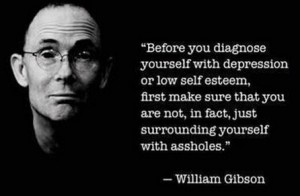Work Is Not Just a Four Letter Word!

As a professional actor on the dole once told me that she couldn’t use an audition as proof of looking for work – it had to be an actual job interview.
Now, I have a lot of trouble in working out the distinction between trying out for work in one’s normal line of work and trying out for a job in an area where one isn’t likely to be employed. It could be argued, I suppose, that she was unlikely to be successful in the audition, but then, she was unlikely to be successful in most of the job interviews given that she had very little experience in anything other than acting.
But that’s the way we look at things. If you’re unemployed, you should be suffering.
I spent some time unemployed, in between some casual work as a teacher. And writing. I was reasonably content at the time. The casual work meant that I earned enough. The unemployment payments were handy when I didn’t get work.
“Someone like you should be working!” I was told. (And this is a true story, I’m not making it up to prove some point!)
Why, I wanted to know, when I’d be taking a job from someone who desperately wants it.
“Why should my taxes support you?” they retorted.
Mm, given I’d actually paid some tax as well received unemployment benefits, I reckoned that I was about even, but in order to compare, I asked them: “How much tax did you pay last year?”
Well, it seemed that the business they were a partner in hadn’t actually done that well. and they weren’t all that sure how much tax they’d paid, and anyway that wasn’t the point. The point was that I WASN’T WORKING and I SHOULD BE.
Now, I considered both the teaching and the writing to be work. But something like writing, well, if you’re not being paid, it’s not work. I thought about suggesting that as the business hadn’t made a profit (on paper anyway) that therefore they hadn’t done any work either.
But that’s not how some people perceive work. If you’re doing a potential money making activity that you don’t enjoy, that’s work even if you don’t enjoy it. On the other hand, if you enjoy what you’re doing, it has to make money before anybody will concede that it’s actually work too.
To oversimplify for a moment, both the Left and Right view having unemployment as unfair. The Left feel that it’s unfair that the unemployed don’t have the same opportunities as the employed. The Right feel that it’s unfair that we support them when they’re not making “a contribution”.
But that was the thing that my period of unemployment taught me. The sort of people who are able to use their time wisely are the ones who are often less likely to be unemployed. And if people discover someone who is using their time to pursue their interests and seems quite content not to have a job, it’s a cause for outrage.
Yes, I’m generalising and – as I’m fond of saying – generalisations are always wrong. But I think that we need to start as a society to look at unemployment as part of an economic choice. When governments decide to reduce tariffs, remove subsidies and slash services, unemployment will result. The idea that somehow this crept up, or caught us unaware is ludicrous. The real question is how we manage the situation.
If we take the Holden situation as an example, there is a managed transition for the workers from the jobs that are disappearing to something else. (At least, in theory.) But when we lowered tariffs opened our borders, and embraced technology, we didn’t seem to regard rising unemployment as the direct result of those policies. It was like an unexpected rainstorm, who could blame us for not having an umbrella ready?
As we move back to a ‘work for the dole’ scheme, some will argue that people have an obligation to give something back in order for our support. Others will argue that work is “good for them”. However, I think it’s about time we actually started looking at the unemployed, not as a group, not as the other, but as individuals who have different capabilities and needs. Rather than making decisions for them and about them, perhaps, we could even ask them for some ideas on what should be done.








